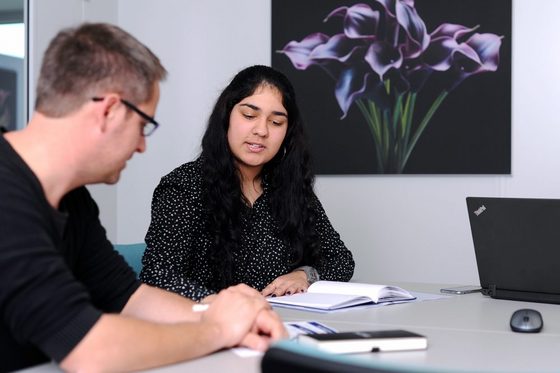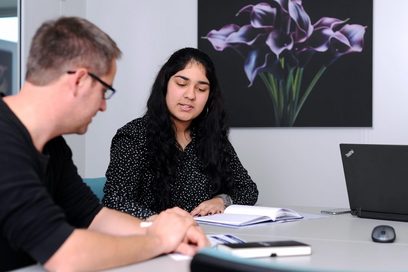Diese Seite ist erreichbar unter:
https://abi.de/unterstuetzung/start-in-germany/applying-and-preparation
Wir möchten unser Online-Angebot gut auf deine Bedürfnisse anpassen. Zu diesem Zweck setzen wir sogenannte Cookies ein. Entscheide bitte, welche Cookies du zulassen möchtest. Die Arten von Cookies werden nachfolgend beschrieben. Bitte beachte: Je nachdem, welche Cookies du zulässt oder nicht, stehen dir anschließend womöglich nicht mehr alle Funktionen der Website zur Verfügung. Mehr Informationen dazu findest du in unseren Datenschutzhinweisen
Einige unserer Cookies sind technisch bedingt – ohne sie würde unsere Website nicht richtig funktionieren. Sie sind unter anderem erforderlich für die portalweite Suchfunktion, das Anzeigen von Videoinhalten und deine Datenschutzeinstellungen.
Diese Cookies ermöglichen es uns, anonymisierte Daten zu deinem Besuch für Statistiken und die Analyse unserer Website zu sammeln. Wenn du diese Cookies zulässt, hilfst du uns dabei, die Website für die zukünftige Nutzung zu optimieren.
Choosing a career is one thing. What else do I have to take into account, though? What requirements do I have to fulfil? And where can I get help?


For many people, it is a great relief when they have finally decided on an apprenticeship or a course of study. Once they’ve done that, there is still a long way to go, though. The next step is to clarify the details. Where exactly do I want to study for a degree or do my apprenticeship? How do I make an application? And what things do I need to do so?
“I always recommend that people do not do this on their own,” explains professional advisor Dr Paul Stallmeister from Ahlen-Münster federal employment agency. “Of course, it makes a lot of sense to read up on the details and make notes from the internet and the brochures. There is so much information that it can be overwhelming, however, and hard to get a clear picture.”
He therefore advises you to talk to the specialists as often as you need to. “The careers advisors at the federal employment agencies have a lot of experience and a good overview of the occupations and the labour market. They can help to clarify the information,” says Paul Stallmeister. The advice is free of charge and is available for questions relating to apprenticeships and courses of study (web.arbeitsagentur.de/portal/kontakt/de). With the specialist advisors, you can also clarify what your chances on the labour market would be with a specific role, or how useful an English-language degree course might be.
Study advisors are also available at universities. They can tell you how individual courses of study differ from each other in terms of their content and which prerequisites you have to fulfil for an application. If you are looking for information on the financing of your studies or an apartment, for example, you can contact the German National Association for Student Affairs.
Experts from the Chambers of Crafts (HWK) or the Chambers of Industry and Commerce (IHK) can provide help with apprenticeship occupations. The Chambers of Crafts are responsible for crafts-based trades such as baker, tailor or joiner. At the Chambers of Commerce, occupations in the field of industry and commerce are the key focus. These can include industrial clerk, hotel manager or retail manager. “The Chambers of Crafts, Industry and Commerce are also well acquainted with the companies that train young people,” explains the careers advisor.
You can generally find advertised positions for dual apprenticeships (in German) using the Ausbildungsplatzsuche (apprenticeship search) feature from the Federal Employment Agency. You can search for college-based apprenticeships in Berufsausbildung und mehr (vocational training and more).
Good knowledge of German is always important. “Level B1 could be sufficient for the manual part of an apprenticeship,” explains the careers advisor. “Getting by with that level at college could be more difficult, though. That’s why I generally recommend B2.” At universities, the linguistic challenges are even greater, which is why a C1 certificate is usually required, such as a TestDaF certificate (Test for German as a foreign language) or a DSH certificate (German language examination for university entrance).
“On a degree course, it is generally the case that formal proof of language proficiency is necessary. The situation is less uniform for apprenticeships: A certificate can be requested at B2 level, for example. However, employers may also decide whether they think the language skills are sufficient,” says Paul Stallmeister. “That’s why it is so important to find out about the requirements early and to obtain the appropriate certificate.” After all, you should also consider this: “It isn’t just the process of orientation that takes time. You also have to allow sufficient time for learning the language.”
For people who have only been living in Germany for some time, there are further points of contact. The Youth Migration Services (JMD) of the Federal Ministry for Family Affairs, Senior Citizens, Women and Youth can help you with your integration and support you with your search for a suitable career. The specialists at Welcome Solidarity of the German Federation of Unions (DGB), on the other hand, can help you if you have questions about apprenticeships – the offer is available in several languages.
In the last year, several portals especially for refugees from Ukraine have been created. For example, both the Federal Ministry of Education and Research and the Conference of the Ministers of Education and Cultural Affairs are now providing information.
“Personal contact is often worth a lot,” explains the career advisor, “not only during the orientation phase, but also during job search.” Those wishing to apply for an apprenticeship position can make a phone call in advance or drop by with the necessary documents in person. “A company is then able to gain a first impression and to ascertain the candidate’s knowledge of spoken German, for example.”
Stand: 08.05.2023
Vielen Dank für dein Feedback zu dieser Seite! Deine Kritik oder dein Lob zu abi.de kannst du uns gerne auch ergänzend über „Kontakt“ mitteilen. Deine abi» Redaktion
Diese Seite ist erreichbar unter:
https://abi.de/unterstuetzung/start-in-germany/applying-and-preparation